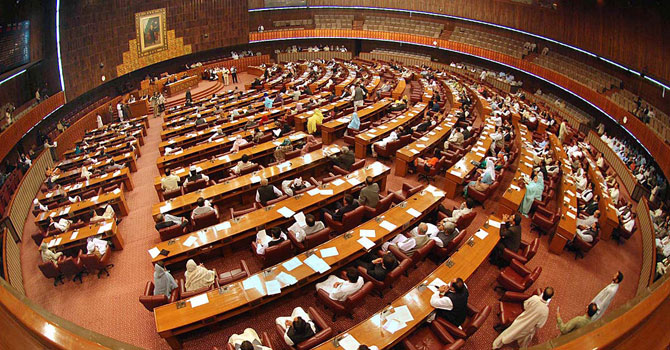
ISLAMABAD: Parliament has a red hot ball in its court after receiving a severe judicial blow from Tuesday’s Supreme Court ruling disqualifying Prime Minister Yousuf Raza Gilani whom its majority wanted to keep.
But considerations of practical politics, rather than past proclamations of parliamentary supremacy, are likely to determine the ruling coalition’s response to an apparent judicial coup that has plunged Pakistan into political uncertainty and will figure high in a bitter political drama leading to next elections.
While the immediate task before the ruling Pakistan People’s Party and its allies, commanding more than two-thirds majorities in both houses of parliament, is the election of a new prime minister by the National Assembly, the controversy about Mr Gilani’s disqualification as prime minister and member of the lower house on grounds of a contempt-of-court conviction are sure to ring through parliament’s chambers and streets of Pakistan in the coming days and months.
Less than a month ago, National Assembly Speaker Fehmida Mirza made a strong assertion of parliamentary supremacy with her ruling that spared Mr Gilani the mischief of disqualification and, then, only five days ago, the lower house, to the exclusion of a protesting opposition Pakistan Muslim League-N, passed a resolution endorsing the speaker’s ruling which it said “cannot be questioned”.
That position was undone by a three-judge Supreme Court bench, headed by Chief Justice Iftikhar Mohammad Chaudhry, which said in its short order that it was “not debarred from inquiring into” the speaker’s May 25 order, which in effect the judges overruled.
The order renewed reminiscences of a famous legal fight of country’s another celebrated speaker, Maulvi Tamizuddin Khan, in the early years of Pakistan with then governor-general Ghulam Mohammad over the 1954 dismissal of the Constituent Assembly and with the then chief justice Mohammad Munir, whose endorsement of the governor-general’s so-called “constitutional coup” in effect denied the sovereignty of the then-parliament.
It is also expected to deflect public attention, to some extent, from a controversy over an alleged financial scam between a son of the chief justice and a property tycoon and the role of some private television channels.
The government’s legal experts have been arguing that after the landmark Eighteenth Amendment of the Constitution, the position of the National Assembly speaker, or of the Senate chairman, is no longer that of a post office to just refer a court ruling about a question of disqualification of a lawmaker to the Election Commission but an incumbent has to apply his or her mind on whether a question of disqualification has arisen.
While the coalition reeled from the shock of the term of its prime minister cut short by about 10 months, there was no immediate indication whether it will knuckle under and risk of its next prime minister facing a similar disqualification or stand up at the risk of heightening political tensions already created by a PML-N campaign over the issue.
And a decision by the ruling coalition -- which also includes the Muslim League-Q, the Awami National Party, the Muttahida Qaumi Movement and some smaller groups and independents from the Federally Administered Tribal Areas – will also determine the next course of action by the National Assembly speaker and of the advocates of the concept of trichotomy of power – parliament, executive and judiciary -- in a parliamentary system of democracy.
Mr Gilani was convicted by a seven-judge bench in April for abiding by a party decision against writing to Swiss authorities to reopen disputed money-laundering charges against President Asif Ali Zardari on grounds of a presidential immunity.
Another party nominee for prime minister will hardly be expected to do otherwise about charges brought against former prime minister Benazir Bhutto and Mr Zardari in 1990s by the government of then prime minister Nawaz Sharif in those days of bitter political fights but which were withdrawn under a controversial 2007 National Reconciliation Ordinance of former military president Pervez Musharraf, which in turn was nullified by the present Supreme Court in Dec 2009.
With Mr Gilani standing disqualified even as a member of the National Assembly, the lower house is expected to meet soon this week to elect another member, most likely from the PPP, as prime minister by the votes of the majority of the 342-seat house.














































Dear visitor, the comments section is undergoing an overhaul and will return soon.